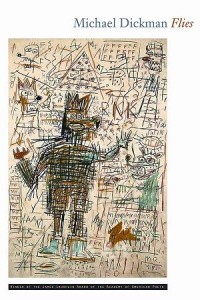Flies by Michael Dickman
 Flies
Flies
by Michael Dickman
Copper Canyon Press, 2011
96 pages / $16 Buy from Copper Canyon Press or Amazon
Upon a first reading of Michael Dickman’s Flies, a reader might be left with impressions abrupt and violent. Perhaps one cannot be blamed for this reaction; the collection oozes strangely enjambed lines and macabre content frequently addressing dark, untimely deaths. Flies, however, does much more than induce the unsettling awe an audience might expect from a horror film, although it does that, too. As a reader takes the time to know and understand the collection — perhaps not so unlike how time is necessary to begin to grieve and to start to heal — we learn that Dickman’s lines are not haphazardly clipped with the sole purpose of creating unexpected suspense and terror, but rather masterfully guide the reader with a humane, almost gentle subtlety.
Flies opens with the poem “Dead Brother Superhero.” The first lines read:
You don’t have to be
afraid (3)
Falling barely short of an end-stop, the first line, “You don’t have to be,” ever so subtly juxtaposes the state of being, via “to be,” with quite the opposite, the dead, as mentioned in the title “Dead Brother Superhero.” This comparative device, in combination with the apotheosis found within the title, results in a grievous, heartfelt magnification of the brother’s deadness.
At other times Dickman’s line breaks summon a subtle duality. In “Emily Dickinson to the Rescue”, the poet writes:
Her legs pumping
her heart
out (22)
Although the speaker states, “Her legs pumping,” perhaps a pumping heart is an even more natural image. Dickman, of course, resists this more traditional description and repetition. He does not write “Her heart pumping.” Instead the piece surprises us with “her heart / out.” Nevertheless, due to the visual layout of the stanza, it is not too far fetched to envision her heart pumping, as we the readers might even go so far as to imagine the slipping down of the verb “pumping” to substitute for that blaring white space. The audience is left with a delicate duality of sorts. We might visualize the image as written of a “heart / out,” perhaps as if wearing one’s heart on her sleeve, but there is also the quietly suggestive nod toward a heart pumping out as it might while bleeding out during the last moments of life.
The second section of the opening poem closes with the lines:
Any second now
Any second
now (4)
Dickman frequently resists more traditional forms of repetition. The phrase, “Any second now,” is repeated but with the variation of a line break. This technique creates an effect within the poem. The language itself is subtly ambiguous. Breaking the line “Any second / now” permits two reading. Firstly, we are allowed a reading identical to the first phrase without a line break, a straight repetition of what precedes. Additionally, due to the enjambement, a second meaning — that the “now” has actually arrived — is possible. If the poem stated, “Any second now / any second now,” we as readers would be left waiting with the speaker for whatever event he is anxiously anticipating. However, because the repetition is varied by the line break we may interpret the “now” both as not yet having arrived and also as having arrived. Due to the poet’s enjambment and, therefore, the emphasis of the second “now” which closes the section, we as readers can be hopeful but not certain that the awaited time has come.
September 13th, 2013 / 11:00 am
